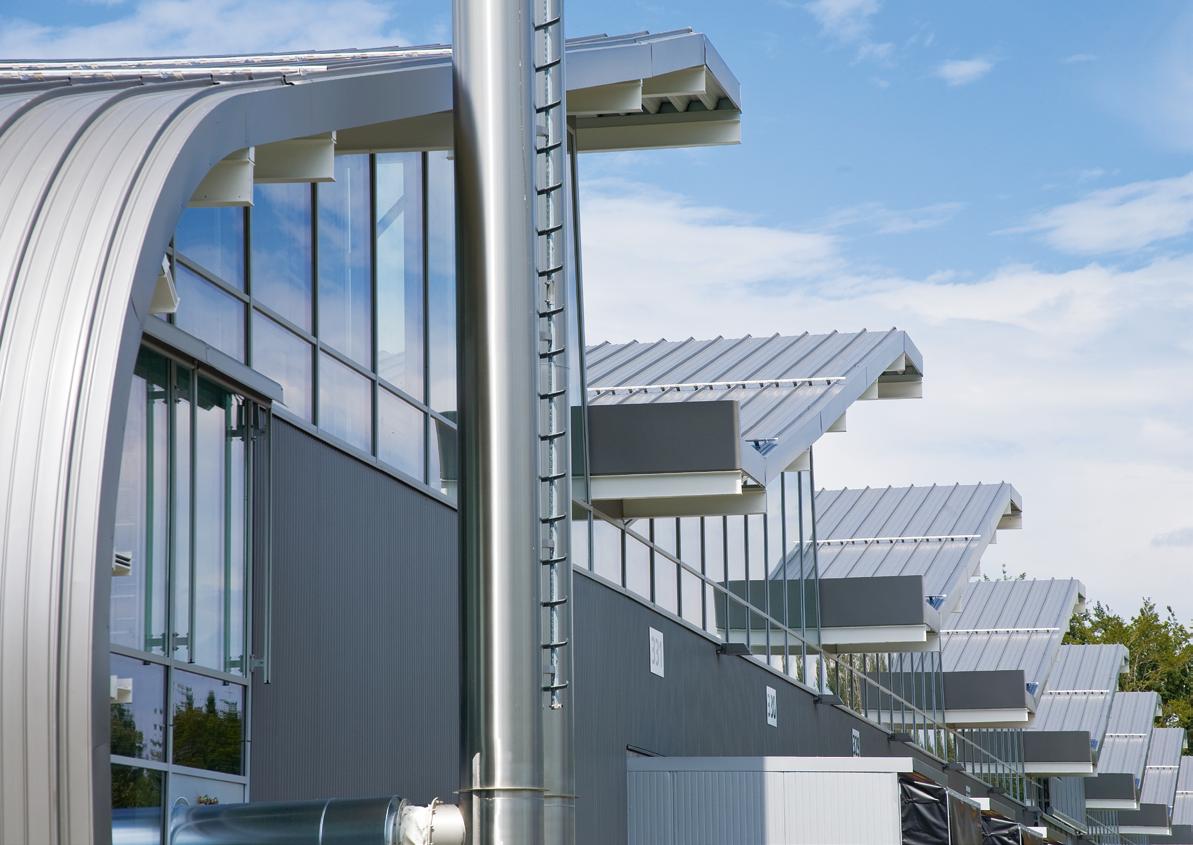
7 minute read
Foundations
Letter from the Executive Board
Dr Peter Stadelmann
Advertisement
Chief Executive Officer Chief Financial Officer
Born in 1965, Dr Peter Stadelmann has been a member of the Executive Board at RATIONAL since 2012. He has been the CEO since January 2014. He previously spent more than 20 years in a variety of managerial functions at the Malik Management Centre St. Gallen. Starting in 2006, he spent six years as operational Managing Director of the Malik Group. ⁄⁄
Markus Paschmann
Chief Sales Officer
Born in 1966, Mr Paschmann has been Chief Sales Officer at RATIONAL since December 2013. After completing his studies in industrial engineering, he began his career at Siemens AG. He was then, among other things, head of the Global Business Unit Electronics at the Harting Technology Group. From 2006 to 2013 he was a member of the Executive Board of Sick AG. ⁄⁄
Jörg Walter
Chief Financial Officer
Born in 1970, Mr Walter joined RATIONAL AG in 2011. He was responsible for the group-wide Controlling activities until he was appointed Chief Financial Officer as of 1 March 2020. Mr Walter graduated as an industrial engineer and has held senior commercial positions at RÜTGERS AG and ROTO Frank AG. ⁄⁄
Peter Wiedemann
Chief Technical Officer
Born in 1959, Mr Wiedemann joined RATIONAL GmbH in 1988 as an engineer. He went on to work as a product manager, supported the development of the American subsidiary and took over the technical division as a member of the management team in January 1996. Since September 1999, he has had the same responsibility as a member of the Executive Board. ⁄⁄
Dear Ladies and Gentlemen,
We are delighted to be able to present our Sustainability Report for 2020. In 2020, we completely revamped the two product families, the combi-steamers and the iVario. We again enhanced our customers’ sustainability with our new products, the iCombi Pro®, iCombi Classic® and iVario® .
The new iVario offers a height adjustment feature, for example, thus enabling ergonomic working at all times for people of different sizes or for different cooking processes. The option of using only particular zones of a pan thanks to iZoneControl means that energy is not wasted by heating unused areas. Our iCombi models reduce energy consumption by up to 10% compared with their already economical predecessor, the SelfCookingCenter. Except for this year, with the decrease in production due to coronavirus, we produce around 80,000 iCombi appliances a year — equal to the total energy consumption of 8,000 of these systems. A further innovation of great ecological importance is that the amount of cleaner needed for the iCombi has been cut by up to 50%. That protects the environment and saves money.
All our products enable our customers to provide their guests with good, healthy food. Using the iCombi and iVario requires less fat, preserves more vitamins and minerals in vegetables and meat, and generates fewer harmful substances during the cooking process. As a result, we help ensure a healthier diet for up to 140 million people a day.
The ConnectedCooking app allows our customers to connect numerous appliances, operate them more easily and, thanks to their integrated hygiene management, ensure the safety of the food served. Automatic software updates, digital transfer of recipes, remote control of the appliances, and remote access by service partners eliminate many round trips, resulting in less traffic with all its downsides.
It goes without saying that we ensure that our new and existing suppliers, as well as our own workforce, do not use any production methods that harm the environment or violate human rights. We continuously strive to further reduce our ecological footprint, both inside and outside the company, through rigorous energy and environment management.
Aside from the fact that, thanks to our joint efforts, we succeeded in tackling the many negative impacts coronavirus brought us in 2020, we are very pleased that we again enhanced — in some cases to a large extent — the sustainability of our customers and RATIONAL.
Despite the negative effects of the coronavirus crisis, we again managed in 2020 to improve our scores with our new products. We are delighted and also feel a little bit of pride in that — and it will help spur us on to achieve even higher goals in our mission to make products that are eco-friendly.
Dr Peter Stadelmann CEO of RATIONAL AG
About this report
Business model for the RATIONAL Group
RATIONAL AG’s business model is presented in the section “Fundamental information about the Group” of the management report, which is why we refer readers to that section here. It deals with the Group’s organisational structure and locations, products and services, segments, and markets, customers and competitive situation. www.rational-online.com/en_gb/company/investorrelations/publications-downloads/annual-reports/
Information on the Sustainability Report
This Sustainability Report has not been audited by an independent auditor. This report reproduces parts of or is closely based on the non-financial consolidated report. They are not explicitly indicated.
The separate non-financial consolidated report was the subject of a limited assurance engagement under ISAE 3000 (Revised) by PricewaterhouseCoopers GmbH Wirtschaftsprüfungsgesellschaft (PwC). It was published on time in April 2021. It is published annually and is available online in PDF form on the company website. www.rational-online.com/en_gb/company/investorrelations/publications-downloads/sustainability-report/
Scope
This report refers in principle to the RATIONAL Group. Accordingly, statements apply in part solely to combi-steamer technology. In cases where information or performance indicators refer only to sub-segments of the Group, this will be stated explicitly. The net approach is used when assessing risks; in other words, when assessing the risks, we include any countermeasures taken, which reduce the probability of occurrence and the possible extent of damage.
Risk analysis
The risk analysis includes potential risks that can arise from the business activity of producing companies in general and from the business activity of RATIONAL AG in particular.
Risk analysis
Definition of the risk areas
Risk management is a core task of the entire Executive Board, which has delegated this process to the Risk Manager. The Risk Manager is authorised to specify methods and set guidelines, and to coordinate risk reporting in the RATIONAL Group. The process managers and executives are responsible for identifying and measuring risks and for formulating and implementing risk management measures. To this end, they are equipped with guidelines that give them direction in the identification, analysis, assessment- monitoring and reporting of risk.
As a sustainable company with a long-term focus, we set great store by a holistic assessment of risk, which means a balanced assessment of non-financial and the resulting financial risks. The RATIONAL risk management system is structured so as to ensure that key risks are systematically identified, measured, managed, monitored and reported to the respective decision-maker. If the company identifies risks that, if they were to materialise, could impact the achievement of corporate objectives, suitable corrective action is taken.
Risk is understood as referring to all events internal and external to the company that may have an adverse effect on areas outside the company (environment, society, customers, employees, suppliers, etc.) as a result of its own business activities and may therefore also negatively affect the achievement of business targets in a defined assessment period.
In accordance with Section 315c of the German Commercial Code (HGB) in combination with Section 289c of the German Commercial Code (HGB), the non-financial report should indicate the material risks associated with the corporation’s business activity as well as those related to its products and services which are or will be very likely to have a negative effect on the aforementioned aspects. It should also discuss the handling of these risks by the corporation. The risks captured during the risk inventory are examined during risk analysis to establish cause-and-effect relationships. They are then assessed in terms of probability and their potential impact on the company’s net assets and results of operations. This analysis also covers the non-financial risks. The risk analysis procedure is dealt with in the risk report in the 2020 group management report, so we refer readers to it here. It deals in detail with the analysis of non-financial risks and how they are captured and assessed.
Definition of the materiality of risks
The definition of material risks from the business activity relates to the two core questions in Section 289c of the German Commercial Code (HGB):
a) Should the occurrence of the relevant risk from the business activity of RATIONAL AG be classified as very probable? b) Does the occurrence of the relevant risk have potential to have a serious impact on the respective area of business?
Risk survey results
No material risks result from the business activity of RATIONAL AG which are or will be very likely to have serious negative effects on the non-financial areas of business outlined in Section 289c of the German Commercial Code (HGB).






